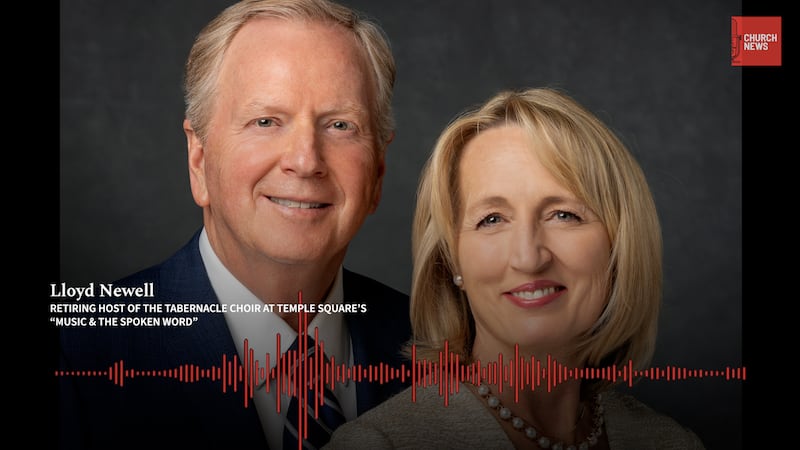For more than three decades, Lloyd D. Newell has served as the voice of “Music & the Spoken Word” with The Tabernacle Choir and Orchestra at Temple Square. In recent years, he has been joined by his wife, Karmel Newell, who has served as the choir’s director of member support. They have traveled the world sharing the gospel through inspiring words and music. Now, the pair’s work with the choir is coming to an end as they embark on a new adventure. The Newells will begin serving as leaders in the California Los Angeles Mission on July 1.
The Newells join this episode of the Church News podcast to share their joyful experience with the Tabernacle Choir, working on the weekly “Music & the Spoken Word” broadcast, and their continued service in The Church of Jesus Christ of Latter-day Saints.
Listen to the Church News podcast on Apple Podcasts, Amazon, Spotify, YouTube or wherever you get podcasts.
Transcript:
Lloyd Newell: Music is so powerful. We’ve had front-row seats to see how music touches people’s lives and makes a difference. I see it every week. I try my best to deliver a good Spoken Word, but really, it’s the music that reaches in and touches people’s hearts. I hope my message adds to and supports that, but I can’t tell you literally the thousands and thousands of people over the years that have said to me, after they hear the choir, “What is it about this choir? What is it about this music? Something’s going on.” And I always say, “This choir is more than just about music. This is a means for The Church of Jesus Christ of Latter-day Saints to share God’s love and hope with the world.”
1:07
Sarah Jane Weaver: This is Sarah Jane Weaver, executive editor of the Church News, welcoming you to the Church News podcast. We are taking you on a journey of connection as we discuss news and events of The Church of Jesus Christ of Latter-day Saints.
For more than three decades, Lloyd Newell has been recognizable as the voice of “Music & the Spoken Word” with The Tabernacle Choir and Orchestra at Temple Square. Along with the choir, he and his wife, Karmel, have traveled the world sharing the gospel through inspiring words and music. Now the pair’s work with the choir is coming to an end as they embark on a new adventure. The Newells will begin serving as leaders of the California Los Angeles Mission on July 1, 2024.
They join this episode of the Church News podcast to share their joyful experiences with the Tabernacle Choir and of working on the weekly “Music & the Spoken Word” broadcast. They will also talk about their continued service in The Church of Jesus Christ of Latter-day Saints. Welcome, both of you, to the Church News podcast.
2:14
Lloyd Newell: Thank you. Wonderful to be with you.
Karmel Newell: Thank you. Nice to be here.
2:18
Sarah Jane Weaver: Well, let’s just jump right in because, for a long time, most of your life, you started with the choir and “Music & the Spoken Word” before you were even married. And so this journey has to feel very defining for who you are. What has it been like to spend so much time with the choir?
2:39
Lloyd Newell: It has been such a blessing to be involved with the choir over these many years. One year turned into five years, turned into 10 years, turned into 20, turned into 30. And now, almost 35 years later, I cannot believe it. When I started this in 1990, I never could have dreamed that all these decades later, I would still be doing the Spoken Word and serving with the Tabernacle Choir. And I can’t think of a better way to begin a Sunday morning. And we have been blessed now for all these years to begin our Sunday morning with The Tabernacle Choir at Temple Square — the greatest choir, I think, in the world. So that association has been such a privilege and such an honor that even talking about it now, my heart is just filled with such respect for the broadcast and the choir and love for what we’ve done.
Over the years, I’ve received literally thousands of letters from people all over the world, people who are LDS and mostly people who are not LDS, that love the choir. And for them, this is their choir. And for many non-LDS people, this is, in some sense, they write me and say, “This is my worship service. This is my church. This is how I begin my Sunday.” And now you can get it delayed so you can listen and watch anytime, and on your phone, on your computer, on your television and so forth. So for me to be able to be a small part of the historic legacy of “Music & the Spoken Word” is just an inexpressible blessing.
4:31
Sarah Jane Weaver: And you started with the choir as I was graduating from high school and entering BYU. My experience with the choir is so much defined by your voice. And that has been a real privilege and a real association.
Now, Karmel, so much of what people accomplish, they accomplish with the support of other people. And this has to have made for some crazy Sunday mornings.
4:58
Karmel Newell: I was thinking about those Sunday mornings over the years. And in some ways, it really should have been more difficult than it was. And I was thinking, well, we did have, you know, crazy mornings at times. I remember pulling out a Webelos book to help my son figure out how to tie his tie, because Dad had already gone.
And I think it had, well, a couple of things; it had Lloyd that’s been so supportive and present all the rest of the time. And two, I think I was just blessed because I don’t remember feeling overly burdened by being the one who’d take all the kids to church alone. And I think I was helped literally by ward members who were kind and would wake up early and shovel snow or come sit by me when I went out with a child. But then also just spiritually and emotionally, I think I was lifted in a covenantal way that happens whenever we take the name of Christ upon us. We feel that enabling power. And so I really don’t have anything to complain about. It was a blessing also for me.
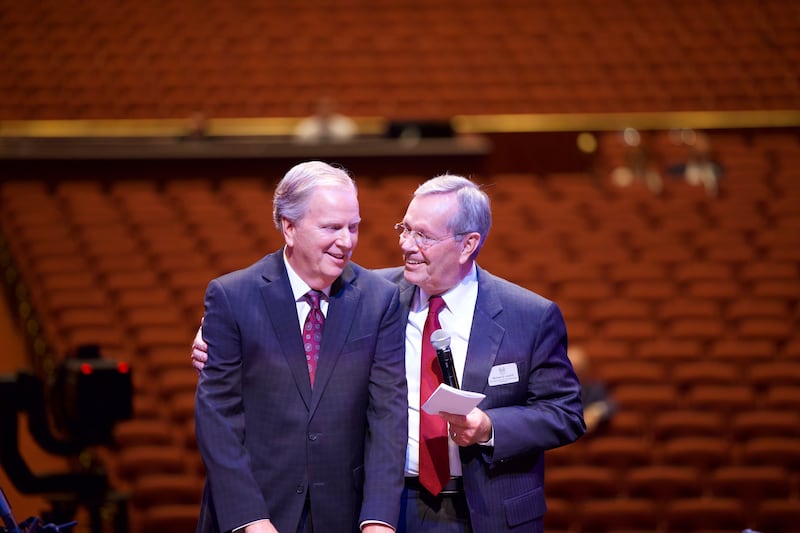
6:00
Sarah Jane Weaver: Well, and in recent years, you’ve had the opportunity to be the director of member support for the choir. Tell us what that is and how you have performed that duty.
Karmel Newell: So, for the 34 years that Lloyd’s been doing this, I’ve been a superfan and a supportive help to him. But I haven’t had a calling with the choir. It’s just been the last two years, President [Michael O.] Leavitt extended a calling for me to serve as a missionary, and the title of that was director of member support, which is similar to what a human resources director might do. And it became very time-consuming. I teach in the business school at BYU, and I ended up letting some of my sections go because it was taking so much time, and I felt like it was an important way to use my time. And so, one of the principal projects I was given is to work closely with President Leavitt to create and develop the global participant program so that the choir could represent the global membership of the Church, which was a very exciting and gratifying opportunity.
7:05
Lloyd Newell: I just want to acknowledge what my wife talked about. And it’s true that for all those years, I was live every Sunday morning. And so I wasn’t home on Sunday morning, and my wife with four little kids would get them ready, go to church. Back in the day, general conference — I would do that announcing — it was live. For 20 years, it was live. So I was up in Salt Lake, Saturday and Sunday, doing that announcing live. And she would be home that whole weekend with the kids. So her great sacrifice and help and support has made what I’ve done possible, and I could not have done it without her.
That is the simple truth: I could not have done what I’ve done without her. She has read pretty much every Spoken Word I’ve written, always makes it better. She has just been by my side every step of the way. So people have said to me, “Oh, it must be sad that you’re leaving this broadcast you love so much.” It’s not just me leaving it. It’s my wife and I are leaving this. And our kids, our four children, in some sense, because they’ve been with me every step of the way. I’ve done this for more than half my life. It’s all our children and family know, is “Music & the Spoken Word” and the Tabernacle Choir.
8:27
Karmel Newell: Before we leave this topic, let me share an important learning I think that I’ve had from many times participating remotely through the broadcast rather than being in the hall live and in person. I think a lot of times, people around the world maybe think, “I need to be there to feel it in the way that I want to feel it.” And I’ve had both of those experiences, and many of them, and they’re both meaningful.
But I would say as I reflect on these 34 years, that some of my most sacred moments have been when I was at home watching the broadcast and participating remotely or watching general conference remotely, and not when I was in the hall. And if I hadn’t had both of those and could juxtapose that so easily, I would say, “Oh yes, you absolutely have to be there.” And I’ve come to know that you don’t, that you can have as much of a witness of the Spirit when you’re at home, with children all around you or whatever your circumstances might be, that you can have that feeling of belonging, even though you might not be there.
9:30
Sarah Jane Weaver: That is beautiful. So now let’s look back and, Lloyd, have you tell us how you came to be the voice of the choir. How does somebody get that job?
Lloyd Newell: Well, my background was in TV news, so I had worked in television news for many years, and when the position became available, I was asked to audition. So I was one of many people who auditioned. Interesting you audition for a Church calling, but it’s similar to the Tabernacle Choir; they all audition to then be called as a member of the choir organization. So I auditioned — this would have been in 1990 — then I began doing it.
And the president of the choir, his name was President Wendell Smoot, and he was such a great man and dear friend, he said, “You keep doing it until we find the person.” So I kept doing it every week. In the meantime, a search committee was formed, and they started to hold auditions, and many people auditioned over several months. And then finally, President [Gordon B.] Hinckley, who headed up this search committee, he extended the call. So I received the call from President Hinckley to be the voice of the Tabernacle Choir and began my first broadcast, it was November of 1990.
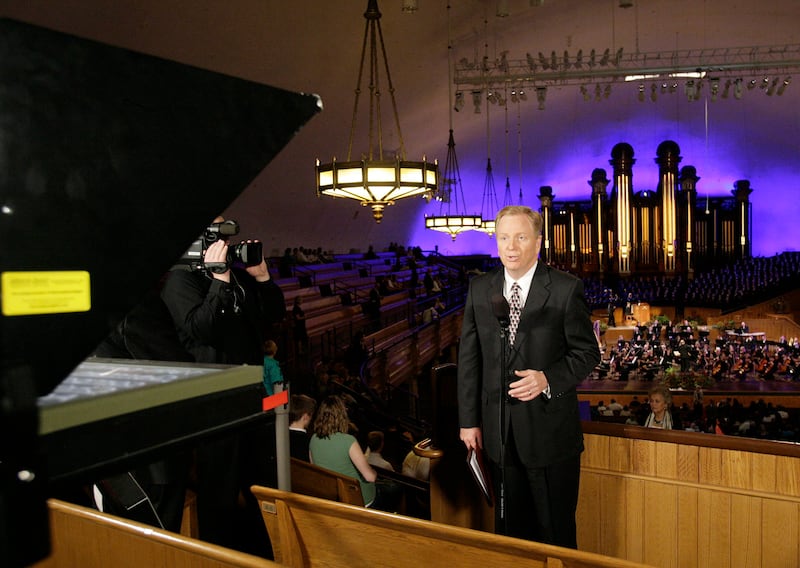
10:57
Sarah Jane Weaver: Wow, that is a remarkable ride and journey. And I want you to talk about how things have changed since then, because my job has changed because technology came on. I started at the Church News in 1995, before the internet, before email was heavily used. And suddenly, you know, you look back and think, “Wow, there’s so much that remains the same and so much that changed.” And so what does that look like for choir broadcasts?
11:32
Lloyd Newell: You’re exactly right. In fact, when President Hinckley called me, he said, “This calling will change your life.” And over the years, most people think it’s my job. I’ve talked to so many people over the decades who think, “This is your full-time employment.” They don’t realize it’s a calling. President Hinckley said, “This calling will change your life,” and it has, for the better. He also said, “Each week should be an inspirational gem.” And that’s what I try to do, is make each Spoken Word an inspirational gem.
But you’re right; I remember back in the day, I would write something, and then I’d go over to the local Kinko’s Copy, and they would fax it up to Salt Lake to be used. This is pre-internet, pre-cell phones. Faxing was a new big invention, so I would fax the Spoken Word up. And today, when I look at the broadcast today, even though we remain essentially the same, it’s still “Music & the Spoken Word,” the longest continuous broadcast in the world; 95 years it’s been on the air. And there have been three announcers: Richard L. Evans, Spence Kinard and me, that even though the essence of it remains the same, it’s changed a lot.
I look at the infrastructure we have around the broadcast now, with technology and the internet capabilities, we have wardrobe and makeup, and just all of these things that didn’t exist back in the day. I would stand up there in front of a microphone and deliver the Spoken Word. We did have a teleprompter. We had that. But that was about it. And it was live. And what came out is what people heard and saw. And now today, we do a lot more pretaping. And I’ve gone to various places around the world to record “Music & the Spoken Word.” The Spoken Word segment, I was in the UK, we just recorded five Spoken Words in the Philippines, I recorded eight Spoken Words in Mexico when we went with the choir. And so that’s something new we’re doing. And production and translation likes it pretaped, but for 30 of my nearly 35 years, it was live.
And now we have the technology that we can pretape. We learned that during COVID, because for almost 20 months, the choir didn’t sing, didn’t get together. But a few months in, we made the decision to go up and record Spoken Words. And then we would insert new Spoken Words in previously aired broadcasts. So during those Spoken Words, I could talk about the pandemic, about COVID, about what we were all experiencing as a nation, as a world community. So those messages were relevant to what was going on in the world.
And that’s where people, production, etc. started to think, “This is nice for translation, for production. You come up, and we’ll record these broadcasts.” I still do it live from time to time, but now it’s primarily pretaped, which has been — we wouldn’t have even thought that way decades ago.
14:50
Sarah Jane Weaver: And so many of these messages you have written yourself. Now, as a writer, I think most people can write one great sacrament meeting talk, they can write one great column. It starts to feel a little different when you do it every single week. You use up some of the things, you have to stretch yourself, you have to start researching.
How have you gotten ideas? And how has this felt like an opportunity to extend your classroom, extend your ministry, and not feel like this burden, like, “Oh, I have to get one of those written”?
15:31
Lloyd Newell: I think because I’ve done it so long, it’s now just part of my schedule and part of my life. My antenna is raised — same with my wife and my children, even — that because my antenna is raised, I’m always listening, looking, reading for ideas. And so I read the newspaper, and I find an idea or two about a future Spoken Word. I go to church on Sunday, and someone gives a talk or shares a testimony, and I think, “OK, that’s a Spoken Word there.” I talk to people everywhere I go. I’m looking, searching, listening for a Spoken Word idea. And I read a lot, where I get ideas as well.
So the ideas have never really been a problem, because ideas are just all around us all the time. Execution has been a challenge at times, as you know, but the ideas are always there. And they’re short — they’re about three minutes, just around three minutes — but each one is a little bit different. As President Hinckley said, each one needs to be an inspirational gem. So I’ve probably given over the years, I don’t know, 200 messages on love, but each one’s different. I’ve probably given 200 messages on hope, and each one is a little bit different. So they each need to be different.
They’re also nondenominational because I’m speaking to a worldwide audience, and we want to connect with people in a universal theme about timeless truths, the everlasting things. So to have that opportunity to be thinking on a consistent, regular basis about what would be an insightful, inspirational gem, what would make a difference in a person’s life. And I can tell you they’ve made a difference in my life.
When I think about what my life, what our life, would be without this weekly responsibility, I’m not sure it would be the same, because it’s changed me as I’ve searched for, as I’ve looked for research, thought about, prayed about ideas to share with our audience. And very often, some of the very best ideas that I think I’ve come up with have been in the middle of the night, where 2 o’clock in the morning, in my mind, I’m thinking about this as a Spoken Word for two weeks from now. And the ideas are always coming.
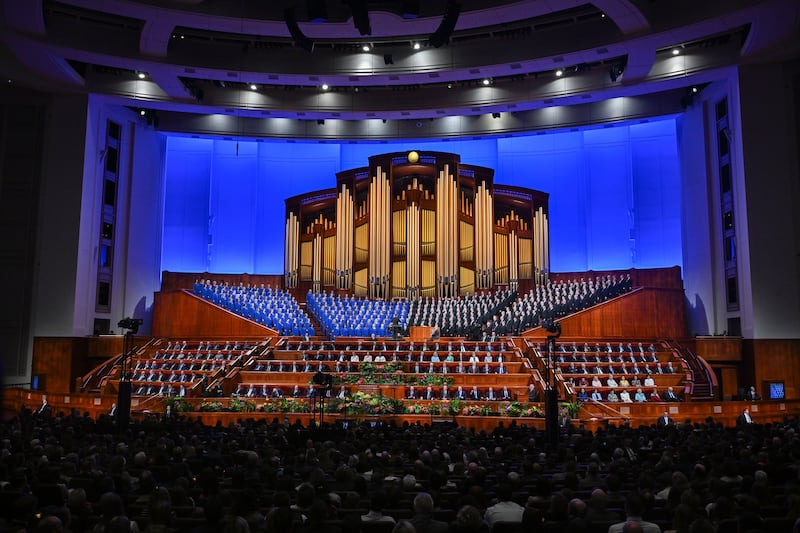
18:14
Sarah Jane Weaver: And you finish your service this month, and then Derrick Porter takes over. Do you have any advice for him? And Karmel, I’d love to hear what advice you have for him as well and for his family. And let’s actually start with you.
18:31
Karmel Newell: I’ve just learned that it’s not about the person giving it, but it’s so much bigger and so much more meaningful than it is about any one person, that this is a way for the Lord to bless His children. And so it’s, just like the music is a way for us to access His love, the message is a way for us to feel God’s love and hope, and really His charity in our lives. So I think maybe if I had any advice, it would be, “Don’t get in your own head and think too much about you being the person who’s delivering it. Just try to do what the Lord would want you to do.”
19:09
Lloyd Newell: That’s really good advice, because if I wouldn’t have been selected all these decades ago, someone else would have done it and done a wonderful job. But as to your question, Derrick and I have met several times. In fact, we’re getting together with his wife so the four of us can talk, because I’ve talked to him many times, but my wife needs to talk to her and tell her what it’s like as well. And I would say to him, much like President Hinckley said to me, that it will change your life. And as Karmel just said: In many ways, it’s not about you. So it’s a means of you sharing with people eternal truths, the everlasting things, that you hope blesses their lives, and in the process, it’ll bless your life.
20:00
Sarah Jane Weaver: And now because of that — that’s a great lead in — what have you observed about the choir and especially music as an instrument to spread goodwill across the globe and to testify of Jesus Christ?
20:13
Lloyd Newell: Music is so powerful. We’ve had front-row seats to see how music touches people’s lives and makes a difference. I see it every week. I try my best to deliver a good Spoken Word, but really, it’s the music that reaches in and touches people’s hearts. I hope my message adds to and supports that, but music is such a powerful influence. I can’t tell you literally the thousands and thousands of people over the years that have said to me, after they hear the choir, “What is it about this choir? What is it about this music? Something’s going on.” And I always say, “This choir is more than just about music. It’s so much more than just music. This is a means for The Church of Jesus Christ of Latter-day Saints to share God’s love and hope with the world. And there’s no better way to do that than through this inspired, beautiful, uplifting music.”
So, as my role as delivering the Spoken Word, I hope to support — never detract from; support — and deliver the message that the choir is singing through their beautiful music. But you could bring people together, you could have a choir and pay them. They could be professionals. And in some ways, Jerold Ottley, the former conductor, used to say there are better choirs in the world, because we could pay these people, but the Tabernacle Choir are all volunteers, all called and set apart. They consecrate their lives to serve for a period of time for a season. And when they sing, they sing with the Spirit of the Lord. And that reaches in and touches people’s hearts.
So I always say to people, “This is not just about music; it’s so much more than music.” It transcends just the notes they sing, because they really touch people’s hearts in a dramatic way. I wish you could just see and read some of the literally thousands of letters of people that have talked about the choir. And I think in some ways, the non-LDS world appreciates the choir. In some ways, they do see the choir differently. And since we’ve been able to travel with the choir and see how people respond to the choir, we know that this really is, as President Hinckley said, this is our gift to the world — the choir and its music.
23:02
Karmel Newell: Besides the grand and glorious events — and there have been so many; the Olympics, the time they sang in Israel, the times that they’ve traveled all around the world, and we could go on and on and on and on about those — I start thinking about individuals and conversations I or someone close to me has had with people who have been touched by the choir. And that’s where I can begin to put my mind around some of the incredible impact of the choir.
And one that comes to mind is when our son was serving a mission in the Czech Republic years ago, there was a man who would seem like probably an unlikely choir fan, didn’t maybe fit the demographics that you would think someone who listens to the choir would fit. And he came up to my son — he was not LDS — and he said, “Are you with the —” he called it the Mormon Tabernacle Choir then, and my son was thinking, “You have no idea, but yes, I am.” And the man said, “Will you please tell them it’s the only thing that stills my soul?” That’s impact, and that’s, just, I think immeasurable.
I think of some of the people we’ve talked to who in their, literally, in their dying moments, it’s been what has comforted them. Or I think of that little girl who met us once and said during her cancer treatments it’s the only thing that would make her feel better. And we’ve met lots of people who’ve shared those kinds of moments. And when I start to think about that, I think we need to think about its impact in ways other than its audience size or how many people attended a concert. It’s the impact, I think, that the Lord cares about, where He says, “A heart was lifted today. A soul was healed, and someone was touched.” That’s really meaningful.
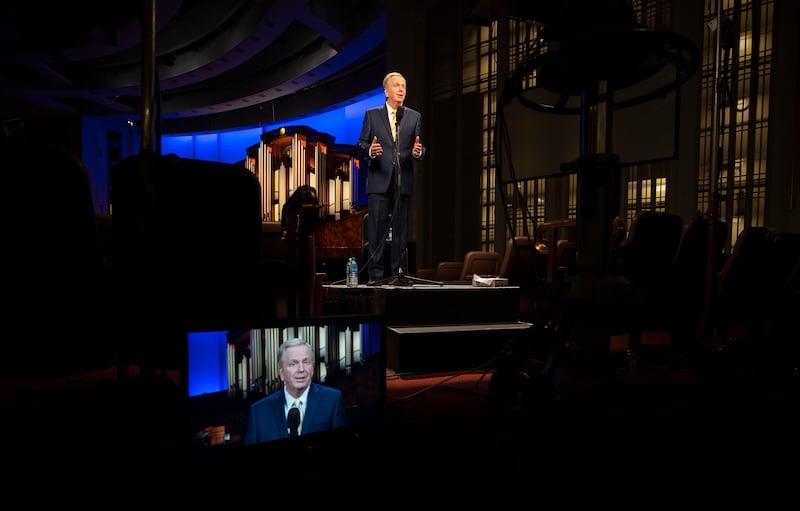
24:54
Sarah Jane Weaver: Well, and it feels like what you’re describing is something that is found in the Doctrine and Covenants, in Chapter 25, Verse 12, where it says, “For my soul delighteth in the song of the heart; ... the song of the righteous is a prayer unto me, and it shall be answered with a blessing upon their heads.” And with that in mind, I’d love for each of you to share some of your favorite choir moments.
25:21
Lloyd Newell: I smile when you ask that, and it’s a good question. But my wife and I, about two weeks ago, we were asked to make a presentation, and they said, “You have 15 minutes to cover your 34-plus years.” And we both laughed and said, “OK, go. Fifteen minutes.” But as we look back and reflect on these years together, there’s so many that come to my mind. First of all, the weekly broadcast and literally meeting people from all over the world.
But a couple of highlights for me were back in 1992. We went to the Holy Land. We had gone on tour that summer. The choir typically goes on tour in the past every two years. So we had gone on tour the summer of 1992, the Midwest, Milwaukee, and right in the center in some of the Northeast and up to Toronto, gone about two weeks, 14 days. I think we did 12 concerts in 14 days. Came home, everybody exhausted, wonderful tour, and when the choir goes on tour, it’s like moving a small army. It’s about 500-plus people with choir, and now we have orchestra.
Sarah Jane Weaver: And instruments.
Lloyd Newell: Instruments. It’s a huge undertaking. But we came home, and about a month later, Jerold Ottley called me and said, “Get ready, because we’re going to the Holy Land. President Hinckley said now is the time to go.” And so we got ready, and it usually takes about two years to organize and put together a choir tour. But with less than six months to go, we left the day after Christmas in 1992. We were in the Holy Land for about 10 days. We did “Music & the Spoken Word” live from the BYU Jerusalem Center; several concerts in Jerusalem, Tel Aviv Joppa and that surrounding area; did a video at the Garden Tomb, the choir sang, “When I Survey the Wondrous Cross”; did a documentary called “In a Land Called Israel.”
And the mayor of Jerusalem, Teddy Kollek, I remember him saying — first of all, he was so thrilled that the choir was there as we did concerts, and we had Jews, Arabs, Muslims, Christians, all gathered in the BYU Jerusalem Center and in these other concert halls. And Teddy Kollek said, “We’ve been trying for years to get these groups together,” which tells you something about the unifying power of music. It brings people together. So that’s one that I just remember so clearly, that we were relatively new in our service with the choir, but to see the influence the choir has to unify, to inspire, was powerful.
28:13
Karmel Newell: It’s hard to begin to think of just one, but one image from a choir tour that comes back to my mind repeatedly is one of the times that the choir performed in New York, and they sang in Carnegie Hall. And the place we were staying was not far from Carnegie Hall, which wasn’t far from Times Square. And so they decided to have most of the choir just walk to the concert in their gowns and their tuxedos. And so I remember looking out over Times Square as we were headed over to the concert, and it was as if light and love and goodness had just infected Times Square. You could see it. You’d see people having happy, joyful exchanges, pointing, “Who are all these people in dresses and tuxedos?”
And there was just this light and happiness about the square that seemed really unusual to me and also really meaningful. It’s become one of my favorite metaphors for what happens when the Tabernacle Choir descends upon a city and brings with it all their light and love and goodness. It’s a little different after. And Times Square felt different in that moment. And then, of course, in Carnegie Hall it was just beautiful, also, but so, so many experiences.
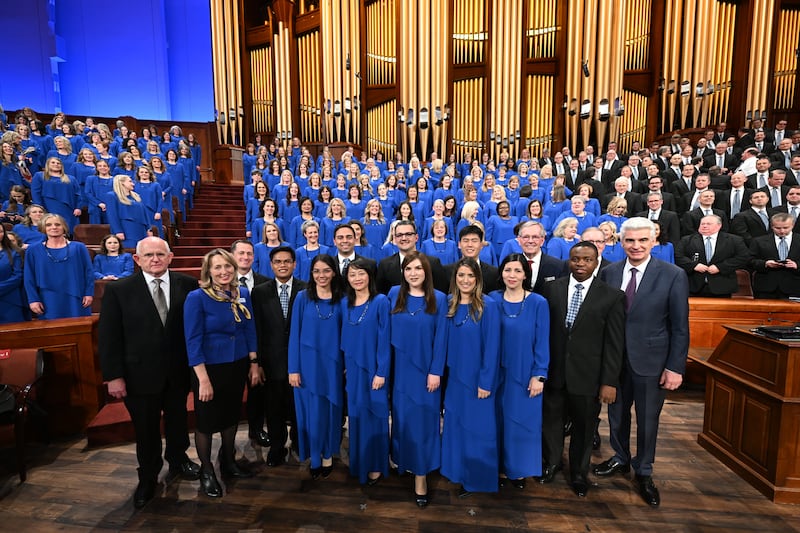
29:27
Lloyd Newell: I think of the 2002 Nauvoo temple dedication. The choir went back, and we did a concert there. The choir sang in the dedicatory services with President Hinckley. But then, after a few of the dedicatory services, the choir did a concert in Quincy, Illinois. And if you know the story of Quincy, it was the refuge, a place that welcomed the Saints who were struggling, who were kicked out of Missouri 1839-ish. And Quincy welcomed them and really helped save them.
And we did a benefit concert in the auditorium, the high school auditorium in Quincy. And I’ll never forget that. And President Hinckley joined us at the end of that and presented — it was a check for, I think it was $75,000, the proceeds of the concert, which he then gave to the city of Quincy in token of our appreciation for what those people did to rescue the Saints.
Those are the kinds of moments that I remember because I was emceeing the concert, and we were waiting for President Hinckley, and he was delayed with other activities. The concert was going on and going on and on, and we were just waiting for him to come. Finally, a car pulled up, and it was him. And he came out and presented the check, and in his inimitable way of extending love to these people and graciousness to them.
I think of the Winter Olympics, when the choir sang at the opening ceremonies. And that’s the one time I sang with the choir. I thought, “I can’t miss this opportunity. I’m the Spoken Word man.” But this one, I said, “I’ve got to be with the choir.” So I got the clothes, and I sat with the choir and sang in the opening ceremonies, lip-synched with the choir just maybe as good as I could do.
Sarah Jane Weaver: You could’ve sang. I bet you sang a little.
31:21
Lloyd Newell: I mean, those kinds of moments singing to 3½ billion people. You talk about — we used to say, “the crossroads of the West.” This place, this ensign to the nations, as the world gathered and looked on. And that was 2002. That was 20 to 23 years ago. So, think of what’s happened since then, that the outreach of this choir as we further its reach. The broadcaster Charles Osgood, who is our good friend, passed away just a few months ago. But he said, “To me, the Tabernacle Choir is like Mount Rushmore and the Grand Canyon.” I think that’s a great image for the choir, is just something that’s permanent, that at the same time is awe-inspiring.
We’ve had so many celebrities come in and perform with the choir. And to a person, they all say, “I grew up listening to the choir.” I remember Walter Cronkite said that: “I grew up listening to the choir on an old crystal radio set.” Oprah Winfrey, Muhammad Ali — I met him; he came to the broadcast and talked about the same thing. So the choir is this beloved, worldwide institution that has spread goodwill for generations.
One of the first things Brigham Young did when he arrived in the Salt Lake Valley, within a month of arriving in 1847, he organized a choir that would be the beginnings of the Tabernacle Choir. And then in 1867, the Tabernacle was constructed, finished, and they started performing and singing in the Tabernacle. And then “Music & the Spoken Word” went on the air July 15, 1929, making it 95 years that it’s been on the air. It’s a remarkable, amazing history. So from our earliest days, we have sung the songs of Zion and gathered people through beautiful music. That is such a blessing that we’ve had to be a small part of this over these many years.
33:33
Karmel Newell: I just thought of something as you were talking about Brigham Young welcoming the Saints here, and a moment that I shared with the global participants when they were in town. We were in one of the upper floors of the Church Office Building, meeting with the Church Music Department, and we talked about Emigration Canyon and Ensign Peak and why they were significant. And then we started to sing just kind of spontaneously, “High on the mountain top / A banner is unfurled. / Ye nations, now look up; / It waves to all the world.”
And when we got to that part, most of us couldn’t sing anymore. We were feeling this witness of the Spirit that that prophecy was being fulfilled, that these nations were literally gathering. And one of the exciting chapters of the choir’s history is happening right now with its world tour to Mexico, to the Philippines and beyond, that we’re seeing how the choir is being an instrument in the Lord’s hand to gather people from all around the world and bring them to the Lord.
Lloyd Newell: And I would just add that song, by the way, was sung on the first broadcast, July of 1929, “High on the Mountain Top.”
34:42
Sarah Jane Weaver: That is remarkable. Thank you so much for talking about all the people who come here. So many of us have favorite Tabernacle Choir Christmas concerts. We have those albums and listen to them every year at Christmastime. And yet, we think about all the people who have come to Salt Lake to hear the choir. And you also made reference to the fact that under the leadership of President Michael O. Leavitt, the choir is now reflecting the global membership of the Church, and the choir is embarking on a tour that will take them across the world over several years, including Mexico City and the Philippines. And we’re bringing people to Salt Lake for general conference who reflect the Church’s international membership.
Talk about the global participant program, what that means and how that is changing the face of the choir actually quite literally.
35:40
Karmel Newell: I think it’s the kind of covenant belonging that our Church leaders have been talking about in recent years, where people are seeing themselves in the choir through these well-trained, well-qualified musicians who are coming from every corner of the world and representing their area. It’s been so meaningful to see how they’ve been received by the choir. In fact, I was talking to one of the global participants as he left, and they had a lot of wonderful experiences here. And I said, “What was the most meaningful to you?” And he said, “How I was embraced by the choir and how I felt so loved and that I belonged here,” because he truly does. This is his choir. And he was proud to represent his corner of the world. And they each come with a story.
And I see also how the Lord is preparing each of them. I think of one singer who was watching general conference with her husband before this program had been announced. And she turned to her husband and said, “I’m going to sing with the Tabernacle Choir.” And he said, “They live far, far away.” And he said, “You mean, maybe someday when I retire? Or what are you thinking?” And she said, “I don’t know. But I know I’m going to sing with the choir.” And they just kind of left it at that. A couple of months later, she was invited to audition. And she was being prepared for this opportunity that she had worked hard for.
These are well-trained musicians. They can sight sing with the best of them. They’re builders of the kingdom in their area, who are temple recommend holders, who are prepared to serve and continue with the training that they receive here. They go back to their countries and bring, we hope, an added measure of insight and opportunity.
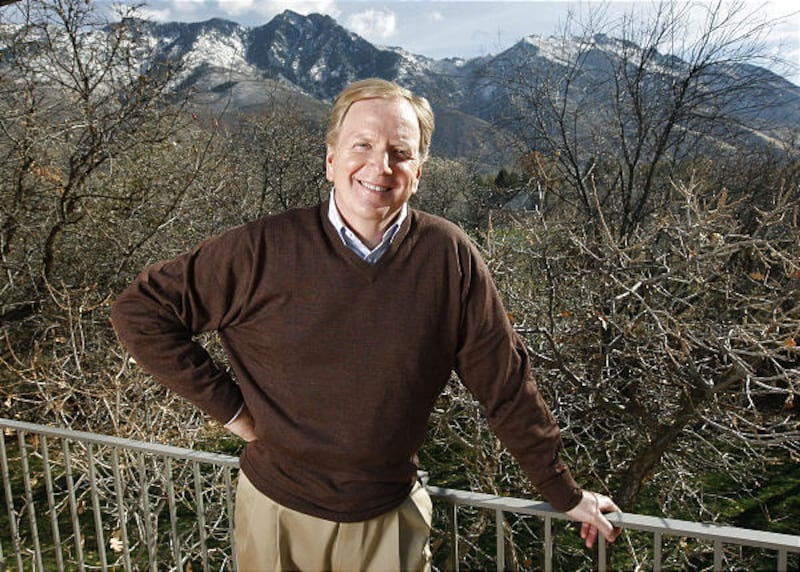
37:23
Sarah Jane Weaver: Well, one of my favorite Church News podcasts is one that we did with that first class of global participants. And at the end of those interviews, they broke out in song, and it really was spontaneous. And they started singing “I Am a Child of God.” And somehow, they knew when to sing each line in each of their languages. And it was a really beautiful, unifying experience. We’ll link to that podcast from the podcast copy here.
But now I want to look forward, because the two of you have worked as missionaries for The Church of Jesus Christ of Latter-day Saints because of your association with the choir. You have taken the good word of the gospel across the globe, and now that’s going to look a little different, because you’re going to focus right in on Los Angeles.
38:21
Lloyd Newell: Our mission is changing — will change, is going to change — and we are getting excited to serve. We didn’t expect this, and this came as a surprise to us. I’ve been doing the Spoken Word so long, and my wife had been serving with the choir as well, but this kind of was not an expected opportunity. But now that it’s come, we’re ready to leave our nets, as the scripture says, immediately and straightway. Those entangling nets that keep us behind, we’ve got a lot still to do before we leave, but we’re prepared to drop those nets.
And many of those nets, they haven’t — in fact, most of them have not — been bad or negative in any way. They’re wonderful things, like the broadcast, the choir, being able to teach at BYU, and other kinds of things that we’re involved in that we love. But this is an opportunity to serve the Lord in a new way. So we’ve been preparing and doing everything we can so that we can go serve the Lord in a new way, and we’re excited. We’re looking forward to it, and we have, last time we checked, about 215 missionaries, nine languages, 14 million people in Los Angeles.
So, that’s all, and we will go there and do our best, and we’re really excited about the opportunity to serve full time together as missionaries and be companions in the mission field.
40:03
Karmel Newell: That really is one of the things we’re looking forward to, is serving together. Even though my calling these last two years has been in the choir, we haven’t been able to do a lot of that together. So we’re excited for this opportunity to serve together.
But we’re also excited for this opportunity to serve with these missionaries. In fact, I think if there’s something I’ve been a little surprised and even at times overwhelmed by, it is the love that has filled our hearts for these missionaries we’ve never met. And I’ve heard other people talk about that and mention that in various settings. But experiencing that has been a powerful witness to me of God’s love, because I’ve never met them. I don’t know them. My heart is filled with love for them. And so I know how much God cares about them and how much we want to do our best to serve them and serve the people in Los Angeles. We are excited.
40:57
Lloyd Newell: That’s well said. It’s a way for us to continue to serve as missionaries, just in a different way, because really what we’ve been doing over the decades has been missionary work. And as members of the Church, that’s what we do. Whatever calling, whatever opportunity we have, we hope to be — as we read in the New Testament, in Timothy — “an example of the believers” (1 Timothy 4:12).
And we hope to emulate the Savior’s light and love and be examples of believers, whether it’s with the choir, in our ward and neighborhood, in whatever we do, and now in this mission, to be an example of the believers and to share our witness that He lives and the Church has been restored and we have a living prophet on the earth today. What greater joy could there be than to be able to serve together in the Lord’s cause?
41:52
Sarah Jane Weaver: And that’s a beautiful place to wrap things up today with the podcast. We have a tradition at the Church News podcast. We like to ask the same question, and we really like to give our guests the final word. And the question is: What do you know now? And so, let’s start with you, Karmel, and end with Lloyd, and have each of you answer the question “What do you know now that you learned from serving with The Tabernacle Choir and Orchestra at Temple Square?”
42:22
Karmel Newell: This is one of those moments where it’s difficult to put into words what I know now, so I think I’m going to use the lyrics of a song. Since I’m not really a singer, I’ll just say the lyrics to this song as a way to express what I know now. And it comes from a song that was sung recently in general conference but also our global participants have sung, and it’s: “His eye is on the sparrow, / ... I know He watches me.” And that’s what I’ve learned, that even though this is a massive organization with a global reach, that it comes down to individuals and people, and God’s watchcare over each one. And I’ve seen that play out in my life, I’ve seen that play out in the lives of these global participants, I’ve seen it play out in the lives of the choir and the audience.
One of my favorite things over the years has been to be in the audience at these performances and watch the change that comes over people. At times, maybe someone comes to a concert maybe begrudgingly or with not the best attitude. And I see their countenance soften and their hearts melt. And they always leave happy, and they always leave lifted, and they leave with a grateful feeling that they came to the concert. And I’ve seen that happen so many times in so many places around the world that I know that this beautiful music is a way for the Lord to bless His children.
43:46
Lloyd Newell: And I agree with what my wife just said, what Karmel just said, which is so beautifully stated. But I have seen the miracles of service, and I have seen the Lord’s hand in this work over these many years. It’s almost unbelievable to me when I think about it. I still have to occasionally pause and ponder and pinch myself just a little. Has it really been almost 35 years? Where did that time go?
But over those decades, I’ve seen the Lord’s hand not just in my life, our life, in the life of the choir and the organization of the choir. Miracles of service like in all these decades, I never missed a Sunday broadcast for illness. I think of the choir miracles of health, weather miracles — which we don’t have time to talk about — and safety and protection over these many years. This is the Lord’s work. And I’ve seen His hand in the service and mission of the choir. And everyone listening to this podcast could say the same thing. I’ve seen the Lord’s hand in my life and as I’ve offered service.
Because at the end of the day, really what it comes down to is loving God and loving our fellow man, fellow woman, the people around us, and serving them with love and kindness. That’s really the message of what the choir is about and what we have been trying to do and what we will do our best to do in Los Angeles. The Lord is at the helm, this is His work, and the choir and “Music & the Spoken Word” is a powerful means to touch people’s hearts through sacred music. And to be able to see that over these years has been nothing but inspirational and transformative for us and our lives.
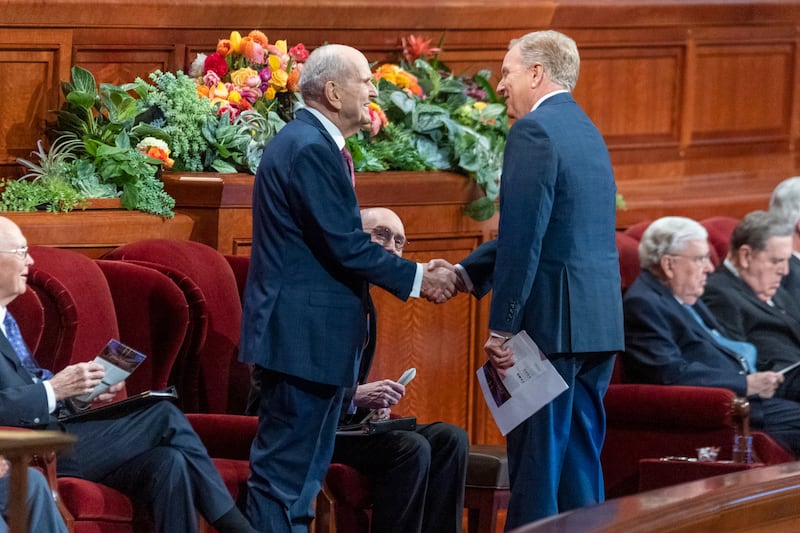
46:05
Sarah Jane Weaver: You have been listening to the Church News podcast. I’m your host, Church News executive editor Sarah Jane Weaver. I hope you have learned something today about The Church of Jesus Christ of Latter-day Saints by peering with me through the Church News window. Please remember to subscribe, rate and review this podcast so it can be accessible to more people. And if you enjoyed the messages we shared today, please make sure you share the podcast with others. Thanks to our guests; my producer, KellieAnn Halvorsen; and others who make this podcast possible. Join us every week for a new episode. Find us on your favorite podcasting channels or with other news and updates on the Church on TheChurchNews.com.


